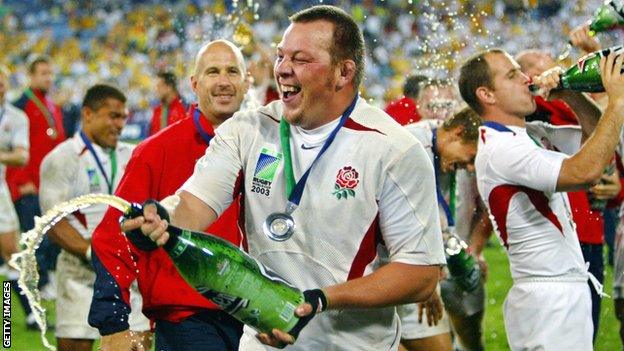Concussion in rugby: World Rugby 'stands with' former players in new welfare plan
- Published

Steve Thompson told the BBC in 2020 he cannot remember any of the games from England's successful 2003 World Cup campaign
World Rugby's chief executive said it "stands with" former players with dementia as the governing body set out a new concussion welfare plan.
Initiatives include support to ex-players and a focus on women's rugby.
World Rugby, the Rugby Football Union and Welsh Rugby Union are currently facing a claim from former players suing authorities for brain damage.
Chief executive Alan Gilpin hailed "incredible, brave testimonies from former players" with dementia.
Gilpin added that the players are "very much part of the rugby family" and World Rugby would "always stand with them in those struggles".
He hoped the new plans will make rugby "a safer, more sustainable game that future generations can enjoy".
The plan, which World Rugby hopes will make it the "world's most progressive sport" in the area, includes:
Post-career care for former players
Head impact prevention
A welfare-driven law review
Focus on the women's game
Continued investment in education programmes
Ongoing engagement with "the rugby family"
'Critical' to prioritise player welfare
The global sporting body will partner with independent healthcare experts, unions and player associations on dedicated brain health wellbeing programs offered to elite players.
World Rugby chairman Sir Bill Beaumont said: "To put player welfare front and centre is critical if we are to grow our sport."
Independent Concussion Consultants (ICC) would be used in men's and women's elite rugby worldwide to provide expert opinion on whether players should return to play after a brain injury.
World Rugby chief medical officer Dr Eanna Falvey explained that ICC were used at the 2015 and 2019 Rugby World Cups to support team doctors and their continuation followed a review on improving concussion outcomes within the game.
There will be several criteria where ICC will have to be consulted for a player to be allowed to return to play.
For instance, if a player has a confirmed concussion and return to play is expected within or on the 10th day, then the team doctor must seek an ICC review.
New law trials to be introduced
World Rugby also announced five welfare-based law trials would be adopted globally on 1 August.
They include 50:22, where if a team can kick from within their own half and get the ball to bounce inside their opponents' 22 then into touch, the kicking team will get the put-in at the line-out.
This has already been tested in Super Rugby AU and is designed to create more space in the field as players drop back to prevent the opposition using this tactic.
Other trials and amendments, external are goal-line drop-out, pre-bound pods of players, tightening the law relating to latching and sanctioning the lower limb clear-out.
'A plan by the game, for the game'
On the subject of women's rugby it was clear the governing body are aware of their need to prioritise this as the biggest growth area of the game.
There will be a specific focus on investing in the women's game around welfare and research, while the head injury assessment process will be implemented at the Rugby World Cup in New Zealand in 2022.
Communication with players and the parents of future players was also highlighted.
Sir Bill continued: "It is a plan by the game, for the game, and will have consultation at its heart.
"We want to build on recent constructive conversations with current and former players, fans and organisations, to make sure we hear from everyone on how to secure the future of the game we all love."

The tough questions facing Uefa: The Sports Desk team look at the problematic side of Euro 2020
Will colonising Mars save the Earth? Why Elon Musk believes it's our only hope
